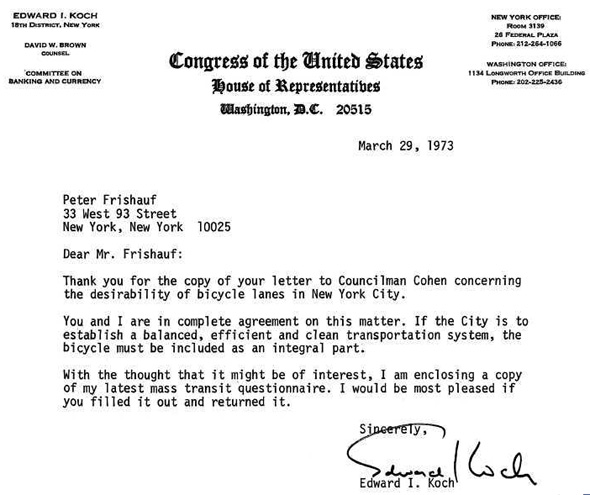Thanks to reader Peter Frishauf for passing on this 1973 constituent letter he received from Ed Koch, who represented New York's 18th Congressional District at the time. Forty years ago, Koch was putting out a more progressive message on bike policy than what we heard in 2011 from another U.S. Representative who had his eye on Gracie Mansion.
Koch, who died last night at the age of 88, introduced some innovative changes to prioritize surface transit and bicycling in the first half of his three-term mayoralty, though not all of them lasted. Many of the bus lanes on Midtown Manhattan avenues were created under his watch, beginning in 1981 with the implementation of the Madison Avenue bus lanes. Tens of thousands of bus riders benefit from these exclusive lanes to this day.
The previous year Koch's administration had put down the city's first on-street protected bike lanes on 5th Avenue, 6th Avenue, 7th Avenue, and Broadway between Central Park and Washington Square. The protected lanes turned out to be a short-lived experiment: On a Manhattan limo ride with President Carter, Governor Hugh Carey mocked Koch for building the lanes, and the mayor had them torn out just a month after they were installed. Twenty-seven years passed before the city got around to building another protected lane.
In Koch's third term, his administration did a complete 180 on support for bicycling, attempting to implement a bike ban on Midtown avenues in 1987. The ensuing revolt against the bike ban, which was delayed by a court ruling and never fully implemented thanks to a rising tide of opposition, was actually the least of the woes plaguing the end of his tenure. Koch's DOT was rocked by scandal when it was revealed, among other things, that the agency had become a nest of corruption under commissioner Anthony Ameruso, a patronage appointment doled out at the behest of Democratic Party bosses.
In terms of a long-term transportation legacy, the most significant act of Koch's mayoralty was to team up with Carey and Albany to fund the MTA's first five-year capital program in the early 1980s, at the insistence of then-MTA chair Richard Ravitch. The investment in transit reversed the decline of what had become a decrepit, unreliable system, turning it into the engine of the city's recovery. Koch and Carey's successors have let transit funding deteriorate since then: Direct city and state support for the MTA's capital program has shrunk to almost nothing.






